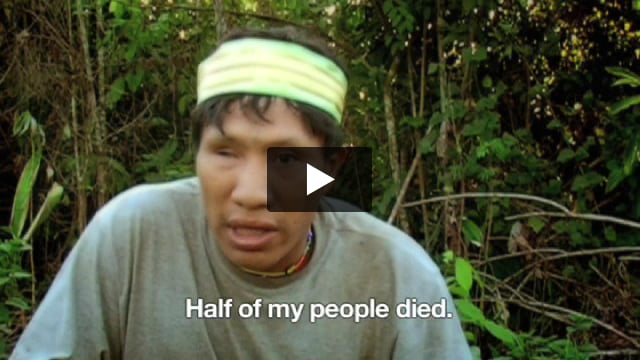Shell - oil & gas company
'First Contact'
Shell’s explorations involved clearing paths into virgin rainforest inhabited by uncontacted tribes. Subsequently, these paths were used by loggers to enter what had been a previously inaccessible region. The result? ‘First contact’ with the Nahua tribe that killed more than half of them.
‘That terrible illness!’
The impact of ‘first contact’ on the Nahua, in 1984, was devastating. There were epidemics, pneumonia and severe shortages of food. One estimate claims that up to 60% of the entire tribe died. ‘Many, many people died. People dying everywhere, like fish after a stream has been poisoned. People left to rot along stream banks, in the woods, in their houses. That terrible illness!’ remembers one Nahua man, Tomas.
Shell ended up discovering gas, not oil, but only decided to do further explorations to evaluate the full potential of the deposits in 1996. It did so fully aware that uncontacted Indians such as the Nanti lived in the region and that they could be decimated, like the Nahua, by contact with its workers.
The 'Camisea project'
Eventually, Shell pulled out of the region altogether. Today, the gas deposits in this region, known as the Camisea gas fields, are exploited by a consortium of companies including Pluspetrol and Hunt Oil. The 'Camisea project', as it is now known, has been strongly criticised. Indigenous organisation AIDESEP said it has contaminated rivers and streams, brought new diseases, and threatened access to traditional food and medicines.
Forced contact?
The area where these companies work, called 'Lot 88' by the government, includes a reserve for uncontacted tribes - the first reserve created for uncontacted tribes anywhere in Peru. According to a delegation of international NGOs, 'Camisea project' employees have allegedly made forced contact with members of some of these tribes. The situation is so serious that AIDESEP has appealed to Latin America's top human rights body, the Inter-American Commission on Human Rights, to suspend work in the region. 'The Camisea project is threatening the fundamental rights of Indigenous peoples and damaging fragile ecosystems and Amazon biodiversity,' AIDESEP has said, in a joint statement with other Peruvian organisations.
From Survival's website
From the web
Sign up to the mailing list
Our amazing network of supporters and activists have played a pivotal role in everything we’ve achieved over the past 50 years. Sign up now for updates and actions.

